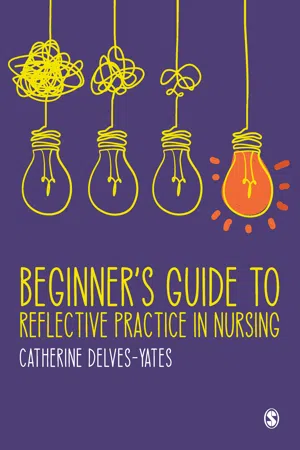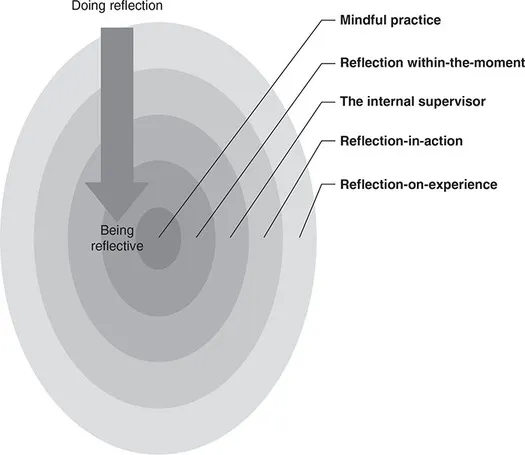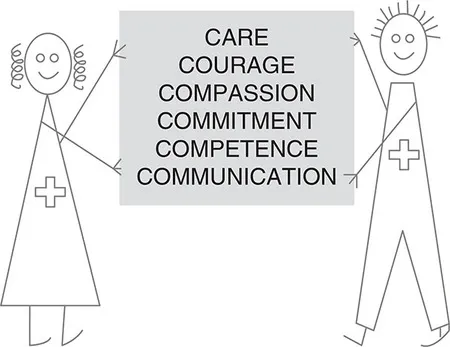1 What is Reflection?
Catherine Delves-Yates
I’m starting to panic. My first assignment is due in two weeks – I have to do a reflection on my experience during my placement. I have been to the sessions on reflection, but I am still confused about what I need to do. What is a reflective model? What should I reflect on?
I went to the library to find a book to help, but that used lots of words I don’t understand and now I’m getting really worried . . .
Alex Charles, nursing student, child field
I’m not sure what I need to do for the reflections for my revalidation. I have lots of experiences I think will be good, but how should I write them down?
Larry Chi, registered nurse, learning disability field
Introduction
Reflection is a term that is used in nursing to describe many different activities, which can make it both confusing and difficult to define. Reflection includes a wide range of practices spanning from the relatively simple ‘doing reflection’, which involves reflection on an experience to ‘being reflective’, which involves a constant state of mindfulness, where nurses are continually vigilant against unskilful actions and negative attitudes that could cloud their judgement (Johns, 2017).
In its simplest form, reflection can be described as a process we frequently undertake without really thinking about it. Think about the last time you treated yourself to something you thought was nice. How did you decide what ‘nice’ was? Probably by reflecting on your previous experience. Just imagine walking into a garden on a hot sunny day and absent-mindedly picking what you thought was a ‘nice’ ripe plum tomato, taking a bite out of it and realising that what you have just bitten into was not a ripe plum tomato but actually a very hot chilli. You would be reflecting on your mistaken choice of ‘nice’ not only as you ran to the closest source of a drink, but also while you drank enough to put out the fire inside you. The sort of reflection that Alex and Larry, who we heard from at the start of this chapter, need to undertake, shares many similarities with this ‘tomato–chilli incident’, particularly in that they are all likely to have the same result of changing future actions.
As Alex and Larry tell us, reflection is an important skill that nursing students and registered nurses need to understand. Many, if not all, universities use reflection to assess the development of a nursing student’s knowledge and attitudes, and the Nursing and Midwifery Council (NMC) requires nurses registered in the United Kingdom to undertake reflection as a way to demonstrate that they are constantly learning and keeping up to date.
Taking a simple ‘doing reflection’ approach, this chapter will outline the fundamental role that reflection has in enabling you to learn from experience, to ensure that you can deliver the best care possible to patients. First, we will consider what reflection is, plus why there is a need for both nursing students and registered nurses to reflect, followed by how reflection can be used to help you learn. Finally, what is needed in order to produce a reflection will be discussed and a simple model that aids reflection will be introduced.
Chapter Aims
This chapter will enable you to:
- understand what reflection means in nursing;
- recognise the reasons why nurses need to reflect;
- realise how reflection will be useful to you;
- make a good start when producing your own reflections.
What is reflection in nursing?
Reflection is a term frequently used to describe learning from experience. While this is a reasonable starting point, a better definition of reflection is ‘thinking with a purpose’. If reflection is thought of in this way, it becomes easy to understand that reflection is an active and at times uncomfortable process, as you may need to consider difficult topics. Thinking in this way involves a number of different elements, so when you hear people talking about reflection, you are likely also to hear a number of other terms being used. Before considering any further what reflection is, it is necessary to understand what is meant by these other terms. To make this more complicated, not only do many of these terms sound similar, they are often used interchangeably. Knowing this is all part of the process of becoming a reflective practitioner, for once you have mastered these terms, you will also be able to join in any conversation about reflection and will sound like an expert.
As has been said, reflection is ‘thinking with a purpose’, with the purpose being learning from an experience. When considered in this way, the term ‘reflection’ highlights another term you will often hear, reflective practice, which is what has just been described: thinking about an experience and learning from it. Reflective practice is an important way to learn from experience, especially the experiences you have in a professional context. In order to help you to learn from your experience, reflective processes are applied. These are a range of specifically structured methods that will help you to think about an experience, learn from it and, most importantly, turn your learning into actions. When you function in this way, you are being a reflective practitioner, using what you have learnt from your experience to ensure that you develop your nursing knowledge and deliver the best care you possibly can.
In this chapter, we will consider some simple definitions to help you to gain a sound understanding of what reflection is. Table 1.1 provides a summary of these definitions. When considering reflection, you will hear or see the terms reflective and reflexive being used. These terms can both, very simply, be thought of as meaning ‘being thoughtful’ and are often used interchangeably. In more accurate terms, reflexive relates to exploring, examining and critiquing your claims or assumptions as the result of an encounter with another person, culture, idea or experience. In general, you will find that reflective is used more often than reflexive, although both the process of writing a reflection and the written reflection itself can be referred to as reflexive writing, whereas the process of talking with another person about a reflection and the spoken reflection itself can be referred to as a reflective discussion.
Reflexivity is the foundation of all these processes. While you may well find that when you are reflecting, you focus on experiences involving others, reflection is actually about you learning how you behave in different situations. Having insight into your behaviour is a very powerful tool, as this gives you the ability to change and enables your practice to be mindful.
As we have said, in this chapter we are taking a simple approach to reflection in order to enable you to gain a clear understanding of a number of important terms. This will ensure that you feel confident in your ability to become a reflective practitioner, unlike Alex and Larry at the start of this chapter.
One of the best ways to think of reflection is to imagine it as being like an onion. Reflection has many ‘layers’ which you need to peel away in order to get from the simple approach of ‘doing reflection’ to the more complex ‘being reflective’ at the core.
Figure 1.1 Reflection as an onion
Source: Adapted from Johns (2017) Becoming a Reflective Practitioner (5th edn). Hoboken, NJ: Wiley-Blackwell. Reproduced by kind permission of John Wiley & Sons.
As shown in Figure 1.1, once you have got to grips with ‘doing reflection’, you need to work on peeling the layers of the onion away, so you can begin ‘being reflective.
Activity 1.1
Before reading any further, considering what you have read so far and any relevant experiences you may have had, if you were asked ‘Why is there a need for nurses to reflect?’, what would you say?
Check the activity answers at the end of the chapter to see if we agree.
Why is there a need for nurses to reflect?
It has been said for many years that reflection is beneficial to professional practice because:
- it enables nurses to learn from their experiences;
- it improves their confidence in both justifying the actions they take and supporting their decision making (Glaze, 2002).
Thus, reflection has the ability to empower nurses, because the knowledge it brings enables them to take control of their circumstances, become more assertive and problem solve imaginatively.
Reflection provides an aspect of retrospective contemplation, which is of great value because this has the potential to facilitate self-knowledge and self-development in the person who is reflecting. So, if a nursing student, like Angus in Part A, reflects on an experience, they can learn about themselves, and make plans to change or develop their actions, attitudes or knowledge.
Thus, the answer to the question ‘Why do nurses need to reflect?’ is to ensure that the care they deliver to patients is always the best possible. While being a reflective practitioner can bring the personal benefits of being able to learn from experience, being confident, assertive and knowing yourself, it is these qualities that will enable you to ensure that, in every situation, you are doing all you can, not only to uphold your professional code (NMC, 2018), but also to demonstrate the attributes of good nursing (DH, 2012), as identified in Figure 1.2.
Figure 1.2 The attributes of good nursing
Source: Delves-Yates (2018) Essentials of Nursing Practice (2nd edn). London: Sage.
Being a reflective practitioner is the key to achieving the expectation that all registered nurses must keep themselves up to date and apply the most recent and best evidence to their practice (NMC, 2018). In order to successfully complete their nursing programme, nursing students also need to abide by these standards. Expectations such as these are of the utmost importance, as they ensure that both patients and the public in general are able to have confidence in the care they receive.
How will reflection be useful to you?
Some of the ans...



